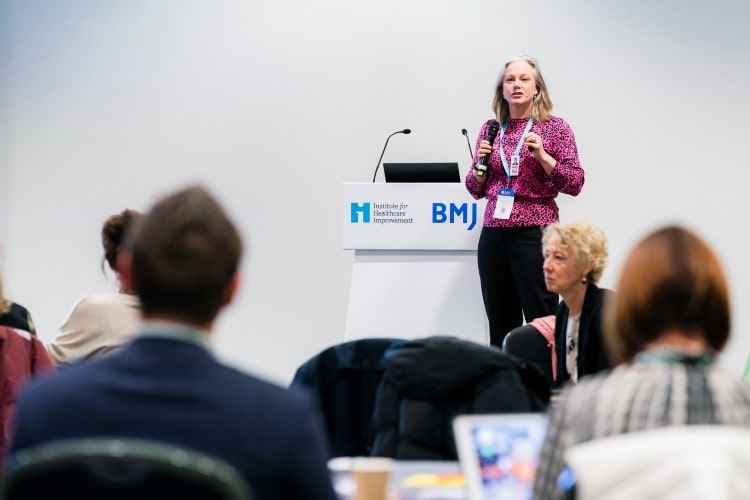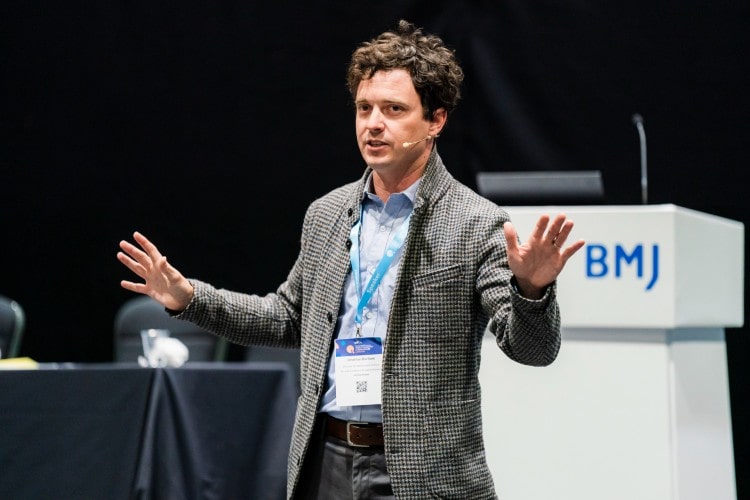Call for Speakers is now closed.
Speaker submissions topics for Utrecht 2025
Our programme theme for Utrecht 2025 is From inspiration to impact: shaping the future of health and care.
Transforming health and care systems for a better tomorrow needs more than just great ideas. We need evidence-based plans for implementation, innovative ways of working within teams and complex systems, rigorous methodology and true collaboration between healthcare professionals and those in their communities.
We aim to create in programme that will tackle the big questions in global health and care, and come up with solutions that have real-world impact.
We want to hear about projects and initiatives that show impactful results under the following six streams/topics:
1. Safety
Harm occurring during healthcare is a huge global challenge. Patient safety involves the prevention of this kind of harm through the effective mitigation of risk – and incorporating aspects of safety science including human factors. Patient safety also involves learning by reporting, investigation and change after events. This includes developing compassionate and inclusive restorative processes after harm has occurred.
We want to hear about projects that reduce the possibility of harm caused by healthcare but also submissions from those working in harm and risk reduction in other industries. From technological safety nets to organisational culture improvement, how are we keeping each other safe as we go about the day to day work of delivering healthcare, plan new services and work across professional boundaries. We’d be keen to see submissions from e.g. safety science specialists, risk management teams, leadership and investigators looking to share good practice.
For Utrecht, we are particularly interested in projects that demonstrate:
- Taking a human factors approach to the prevention of harm
- Learning by reporting, investigation and change after events
- Safety-II: enhancing systems and learning from successes
- Lessons from harm and risk mitigation outside of healthcare
- The role of technology in patient safety
- Embedding patient safety into organisational culture, across professional boundaries
- Organisational Flow
- Psychological Safety
2. People
We want to hear about your improvement projects where health and care professionals are working together with patients, carers or people with lived experience to co-produce a real difference to communities. This includes patient leaders who are creating real improvements to the experience of patient care.
We are also interested in healthcare professionals co-producing with patients, as well as co-production across social care and education sectors to improve health.
If you are a patient, or working in partnership with patients, to create better healthcare, we want to hear from you.
For Utrecht, we are particularly interested in projects that demonstrate:
- Co-production in action
- Advancing Equity
- Health and wellbeing of staff
- Finding human-centred hope for the future
- Human and tech collaboration
- Metrics that matter
You can find more detail on the above People topics here.
3. Populations
In this stream, we are recognising the imperative for improvement to meet the needs of the whole population. We are particularly interested in work that addresses one or more of the following areas:
- How can we use approaches to understand need and plan care for whole communities e.g. large data sets, methods to engage and listen to communities
- The application of improvement approaches that focus on a specific population group, health outcomes, health inequalities, equity or social determinants of health
- Improvement across boundaries and examples of collaborations and or capability building across organisations and sectors (e.g. health, social care, education)
- How technology is bringing new challenges and opportunities for scaling care across populations
- Overcoming global health or inclusion health issues
- How health systems or organisations are taking a systematic approach to population health and equity and sharing the impact
We are particularly interested in work that demonstrates articulation of the challenges and impacts that have been achieved.
4. Change
For Utrecht, we are particularly interested in projects that demonstrate:
- New and novel methods for change
- Partnerships for change (especially with people who use services and/or communities)
- Making change happen across a whole organisation, system, region or country
- How a theory of change helped you to achieve your aims
- When high-performing teams become change agents
- What you learned when change didn’t work
- How to build collective intelligence about change
5. Science
This stream will showcase the best work that is applying the science of improvement with high rigour, and advancing the field of improvement science. We’re particularly keen to hear from people applying good design and evaluation methods in health and care improvement. We’re looking to define the approaches and methods being applied within health and care to improve quality of care, improve population health, tackle equity and enhance sustainability. We’ll be working with the Editors of BMJ Quality and Safety and BMJ Open Quality to highlight the best work submitted.
For Utrecht, we are particularly interested in projects that demonstrate:
- Opportunities for AI in Quality Improvement
- The intersection between implementation science and improvement science
- Data and practical measurement of performance (including big data for improvement)
- Evaluation and rigour
- New thinking on spread and scale methods
6. Leading
Leading for better health is ever more complex and challenging, yet also ever more exciting since we have a constantly-growing base of evidence and experience on which to draw. “Leaders” can be health or care professionals, patients, community-leaders or others—we’re interested in all forms.
What does “leading well” look like today in a complex world with multiple needs and aims? How can leaders encourage progress at one and the same time across all dimensions where results matter: patient outcomes and experience; safety; population health and equity; sustainability/environmental health; cost; staff experience and wellbeing?
Submissions should include co-produced, creative solutions and strategies which are of practical use to people working toward better health – be they community organisers, ward team leaders or executives in large systems, charities or other organisations. And submissions which are grounded in practice and real-world application, not only in theory. We particularly encourage submissions which draw on experience across multiple countries and from younger, emerging leaders.
We are particularly interested in work that demonstrates the link between leading well and results that matter. We’re looking for content that is grounded in deep connection to people receiving care and motivates those providing care, often in complex and difficult contexts.
This stream will be developed in partnership with BMJLeader, the journal for evidence and debate in leadership across health and care.
For Utrecht, we are particularly interested in projects that demonstrate:
- Leading effectively for diversity – including working with multiple generations simultaneously in the workplace
- Leading for sustainability -including cost and access, environment/climate and an emphasis on waste reduction
- Leading with kindness and compassion – helping people working in health and care to thrive and maintain their energy and humanity
- Leading with engagement of people receiving care
- Leading in difficult circumstances – leading oneself and others in challenging contexts and environments, including finding opportunities for collaboration for the greater good
Patient representation and lived experience
Submissions are expected to be co-produced with patients, service users, citizens and carers wherever possible. We have representatives on these groups in all our planning committees, and are working to increase the representation of these groups as speakers and delegates.
Contact us
You will be notified of the outcome of your submission by email in early November 2024. Please note the email address that you supply in the Submitter Details page will be the email address used to correspond the results of your submission. If you change email addresses during this time, please let us know so we can update your records.




